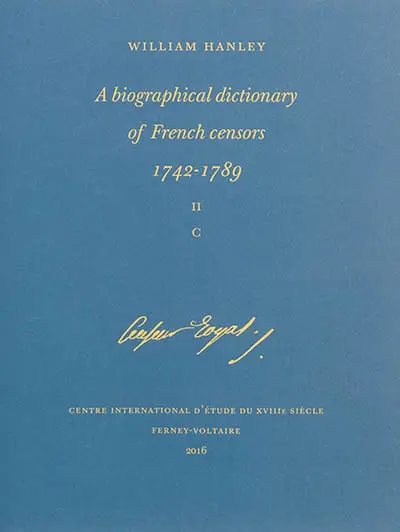en savoir plus

Permet à tous ses détenteurs d'obtenir 5% de réduction sur tous les livres lors du retrait en magasin (réduction non cumulable avec les réductions de type étudiant).
Offre également un certain nombre d'avantages auprès de nos partenaires.
Avec les favoris, retrouvez dans un espace les sélections effectuées au fur et à mesure de vos navigations dans le site.
Constituez pour votre usage personnel vos listes de livres en prévisions d'achats futurs et votre sélection d'articles, dossiers, événements, vidéos ou podcasts préférés ou à découvrir plus tard...
Il suffit simplement de cliquer sur "Ajout Favori" sur chaque page qui vous intéresse pour les retrouver ensuite dans votre espace personnel.
Requiert un compte Mollat
Requiert un compte Mollat
A biographical dictionary of French censors, 1742-1789. Vol. 2. C
Auteur : William Hanley
en savoir plus
Résumé
Ce volume rassemble 37 notices biographiques de censeurs royaux, notamment A.G. Camus, C.N. Cochin, A.F. Cotterel, A. Court de Gebelin, Crébillon père. L'ensemble permet de mesurer combien les idées reçues sur la censure dans les dernières décennies de l'Ancien Régime sont révisées par une étude attentive des archives de la Librairie. ©Electre 2026
Quatrième de couverture
«Ce premier volume est donc une réussite à peu près totale dans un domaine d'une rare complexité. L'ensemble permet de mesurer combien les idées reçues sur la censure dans les dernières décennies de l'Ancien Régime sont révisées par une étude attentive des archives de la Librairie. On pourrait dire de l'ouvrage de W. Hanley en pastichant Bélisaire : "La vérité luit de sa propre lumière".»
François Moureau, Bulletin du bibliophile
«Given the incomplete and uneven nature of the sources, it may be nearly as difficult to do a full-fledged, sociological study of the censors as it is to write a social history of authorship in eighteenth-century France. But the censors are listed in the annual volumes of the Almanach royal, and they left many traces of their careers in the Collection Anisson-Duperron of the Bibliothèque nationale de France. Using these and other documents, William Hanley is preparing a rigorous biographical dictionary, which will make it possible to develop a prosopography or collective profile of all the censors during the last five decades of the Ancien Régime.»
Robert Darnton, Censors at work: how states shaped literature
Under the ancien régime the law required that books be authorised by the State in order to be published legally in France. Among the most important functionaries involved in the screening of ideas were the primary agents of this preventive censorship, the royal censors. Given that their verdicts were normally accepted by their superiors they played a crucial role in the policing of thought and are of vital importance in any consideration of the dissemination of thought in the Age of Enlightenment.
This biographical dictionary of the 367 men who served as censors between 1742 (the year in which their names began to appear regularly in the Almanach royal) and 1789 (the year in which their activities ceased) covers a particularly crucial period in the struggle for freedom of expression. It seeks to present as complete a picture of them as possible. The entries are organised under the following headings: name, birth and parents, civil state, career, death, posterity, reports on works examined, signature, further references, and notes.
To a large extent the originality of this project lies in its sources. In the interests of precision and completeness a thorough search of archives, manuscripts, and eighteenth-century printed books and journals has been completed in order to base the biographical sketches on primary sources pertaining to the major events in the censors' lives. A great deal of material has been located at the Archives nationales, especially in the Minutier central des notaires; information has been collected from the archives of most French departments, numerous towns, a number of foreign countries, and the Bibliothèque nationale de France; and in that library the extensive manuscript collections concerning the book-trade have been consulted extensively.
This work will serve as a valuable research tool. For the first time the names of all the censors who served during the period are brought together. The results eliminate the confusion or ignorance which surrounds many of them and some are identified for the first time. New material is made available concerning their public and private lives. Errors are corrected and the process by which the printed word was scrutinised is clarified. Of particular interest is the insight gained into the prevailing values of the establishment and into the attitudes and techniques of those who sought to subvert them. Though the censors played a critical and sometimes surprising role in the struggle for the minds of the nation, their place in the history of ideas has not been fully appreciated. This work enhances our perception of their contribution to the ideological life of eighteenth-century France and our grasp of the structures within which they worked.
A biographical dictionary of French censors will be completed in six volumes.
Fiche Technique
Paru le : 10/02/2016
Thématique : Police
Auteur(s) : Auteur : William Hanley
Éditeur(s) :
Centre international d'étude du dix-huitième siècle
Collection(s) : Publication du Centre international d'étude du XVIIIe siècle
Série(s) : A biographical dictionary of French censors, 1742-1789
ISBN : 978-2-84559-120-2
EAN13 : 9782845591202
Reliure : Broché
Pages : XI-632
Hauteur: 27.0 cm / Largeur 21.0 cm
Épaisseur: 4.0 cm
Poids: 1840 g

